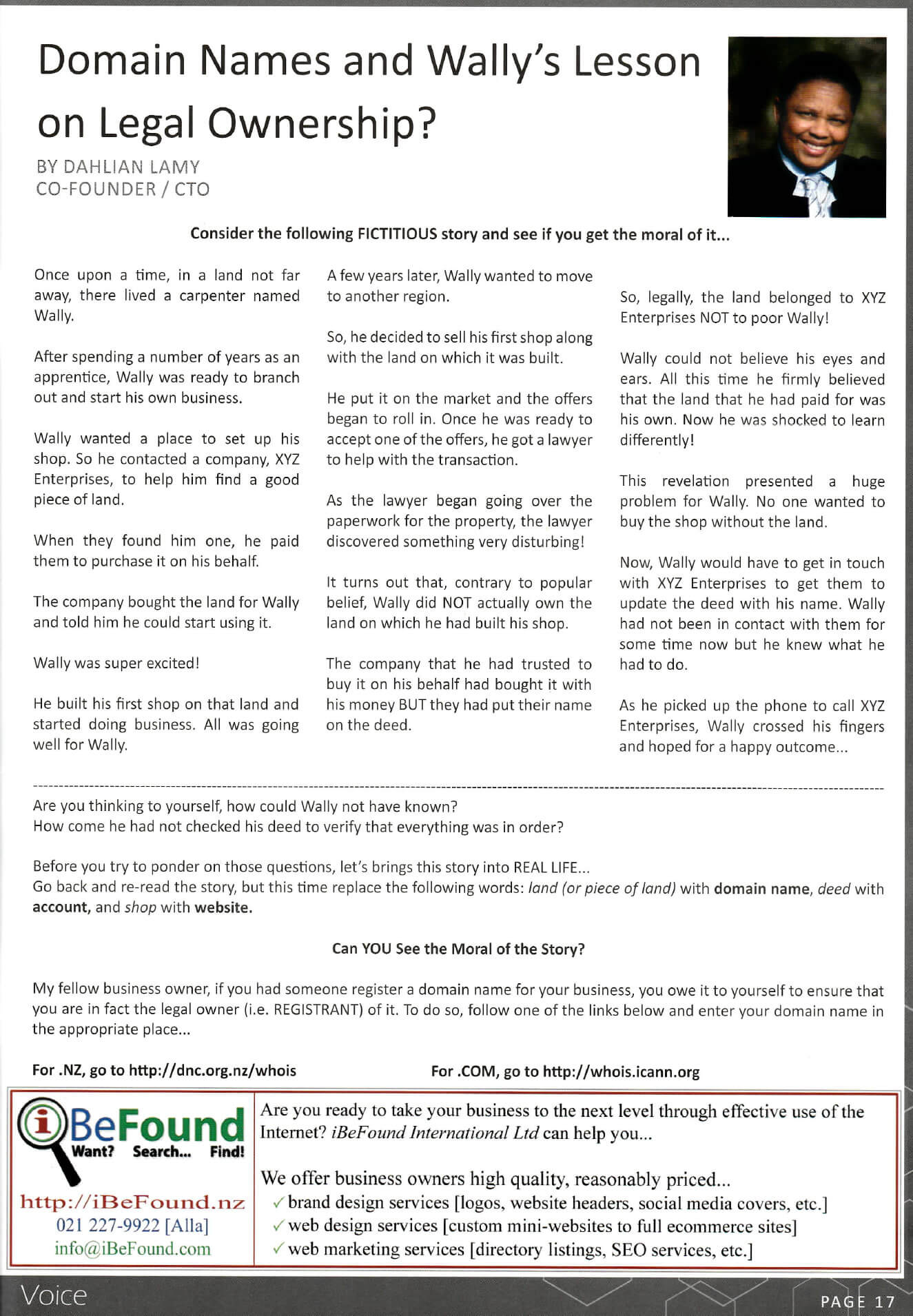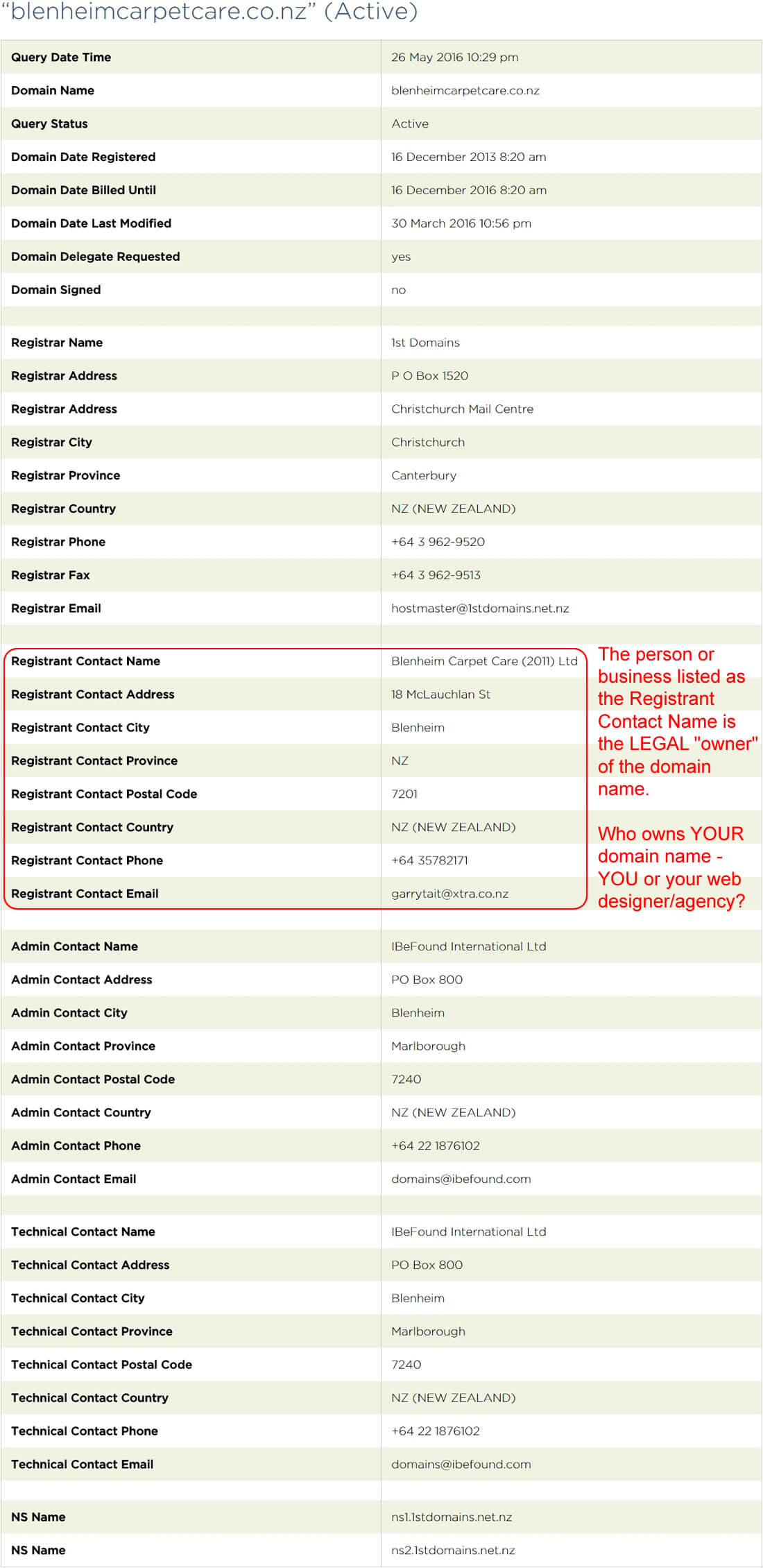- Tap for Menu
- Website Design ▼
- » Custom Website Design
- » Why Love Marketing Websites
- » Explore Website Features
- » Web Hosting Options
- » Website Design Process
- » Website Maintenance
- » Payment Options
- » Compare Website Options
- » Questions & Objections
- Portfolio ▼
- » ALL Website Examples
- » By WEBSITE TYPE ►
- » » 1PAGE Biz
- » » INTRO Biz
- » » BASIC Biz
- » » STANDARD Biz
- » » eCOM Sites
- » By BIZ NICHE ►
- » » Hospitality
- » » Product Sellers
- » » Professions
- » » Skilled Trades
- Testimonials
- Learning Center
- About ▼
- » Who We Are
- » Contact Us
How & Why to Determine if YOU are the Legal Owner of the Domain Name YOU Paid For
- Navigation
- Website Design ▼
- » Custom Website Design
- » Why Love Marketing Websites
- » Explore Website Features
- » Web Hosting Options
- » Website Design Process
- » Website Maintenance
- » Payment Options
- » Compare Website Options
- » Questions & Objections
- Portfolio ▼
- » ALL Website Examples
- » By WEBSITE TYPE ►
- » » 1PAGE Biz
- » » INTRO Biz
- » » BASIC Biz
- » » STANDARD Biz
- » » eCOM Sites
- » By BIZ NICHE ►
- » » Hospitality
- » » Product Sellers
- » » Professions
- » » Skilled Trades
- Testimonials
- Learning Center
- About ▼
- » Who We Are
- » Contact Us
Strictly speaking, no one "owns" a domain name. When someone registers a domain name they are licensed to use that domain for as long as they continue to pay the licence fee.
So, while ownership is NOT an accurate term to use in relation to domain names, it is nevertheless more easily expressed and understood in everyday conversation than saying something like "have the legal right to use".
Back in June 2015, I was moved to write an article (see below) on the issue of legal ownership of domain names for a quarterly magazine of our local Chamber of Commerce. The aim was/is to educate fellow business owners about an issue that we keep encountering. I'll let you read the article and then I'll elaborate.
The Registrant is the LEGAL "Owner"
When a domain is registered, a record is created about it in an online database. This record is commonly know as a Whois (pronounced "who is") record. This record is publicly available online and can be retrieved via a Whois search (domain name search) of the appropriate database.
Most domain registrars, as well as the organizations that oversee domain names, provide a whois search function on their websites.
- For domain names ending in .NZ, go to https://dnc.org.nz/whois
- For domain names ending in .COM, go to http://whois.icann.org
The Whois record provides information about a variety of things, the most important being:- when the domain name was registered
- when it is due to expire
- which domain registrar currently maintains it (i.e. registered it or received it in a transfer)
- who is the legal "owner" of the domain name - the REGISTRANT Contact
- who manages the non-tech stuff related to the domain name - the ADMINISTRATIVE Contact
- who takes care of the tech stuff related to the domain name - the TECHNICAL Contact
Here's an example of the Whois record for the domain name of one of our clients.
Rights of the Registrant
Ignorance is NOT bliss!
It is up to YOU to verify that any domain name that you believe you own has been registered in your name. Do a Whois search immediately and check the Registrant Contact details:
- Is your name or business name listed there?
- Is the address yours and is it up-to-date?
- Is the phone number yours and is it correct?
- Is the email address yours and is it correct?
In addition to having the right to use the domain name, the Registrant has the power to make changes to the domain name record. This includes:- correcting or changing the Registrant's name.
- transferring the domain name to another person or business.
If you are NOT currently listed as the Registrant of a domain name you believe you "own", consider this...- What if the person currently listed as Registrant dies?
- What if the business currently listed as Registrant has creditor problems or files for bankruptcy?
- What if the current Registrant transfers the domain name to someone else?
- What if you have a falling out with the current Registrant?
What would happen to "your" domain name?
Responsibilities of the Registrant
Not many people think about the obligations and responsibilities that comes with being the registrant of a domain name. For registrants of .NZ domain names, the policy on .nz Principles and Responsibilities states:
9.1.4 Ensure their use of a domain name will not infringe any intellectual property rights, and indemnify the Registrar against any claim resulting from a breach of this obligation.
9.1.5 Ensure the Registrar's services, and the domain name, are not used for an unlawful purpose.
9.1.6 Ensure that any order of any Court or other Tribunal having jurisdiction regarding any domain name registered to a Registrant is complied with.
9.1.7 Ensure everyone the Registrant is responsible for, or who uses a domain name registered by the Registrant, complies with the duties listed in this policy.
Now, what does this mean for those web designers, web agencies, IT companies and others who have been listing themselves as the Registrant when they registered a domain name on behalf of a client, a friend, or a relative?It means that if that domain name is used in connection with illegal or unlawful activities, you as the Registrant can be held accountable.
What if the domain name is part of an email address being used for spamming activities?
What if the website connected with the domain name violates the Harmful Digital Communications Act?
Who do you think the authorities will contact?
Obviously the person or business listed as the Registrant of the domain name!
Updating Incorrect Registrant Details
In this past week, we've had to bring to the attention of a couple clients that they are not the legal "owners" of their domain names. Now they are in the process of contacting the person/company who registered the domain for them to try to get this issue rectified. Fingers crossed.
As stated earlier, ONLY the current Registrant has the power to request a NAME change to the Registrant details. This usually requires a special form to be filled out, signed and submitted to the domain registrar via fax, mail or email. You'll need to check the domain registrar's website for the appropriate form.
Whether you left it up to someone else to register a domain name on your behalf, or you register domain names for others, it is in YOUR best interest to verify that the correct person / business is listed as the Registrant in the domain's Whois record.
Resources for Registrants
Here is some additional information on the topic of domain name registration that you might find useful:
- Who Owns Your Domain Name?
- Who Controls Your Domain Name?
- How to Secure a Well-Chosen Domain Name
- Is YOUR Domain Registrar Proving its Worth?
- Local Domain Registrars Based in Top Regions Worldwide
Start the Conversation with a Consultation Request!
Check Out NZ Locations We Serve
Auckland Bay of Plenty Canterbury Gisborne Hawke's Bay Manawatu-Wanganui Marlborough Nelson Northland Otago Southland Taranaki Tasman Waikato Wellington West Coast See Recent Website Design Projects
© 2014 - 2026 iBeFound Digital Marketing,
a subsidiary of iBeFound International Ltd
PO Box 321, Hāwera 4640
021 227 9922



